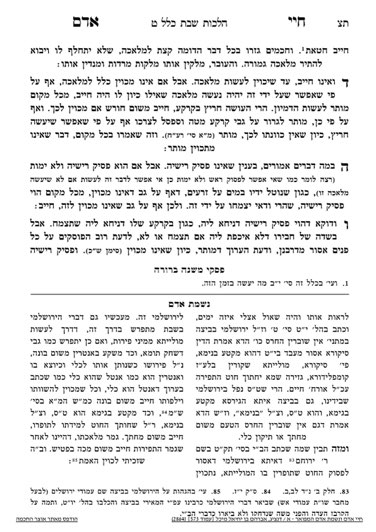We are beginning siman 6, where the Chayei Adam will introduce a caveat to the concept of psik reisha. We know that a davar she’eino miskavein is muttar, but a psik reisha makes it assur and chayav. In this siman, the Chayei Adam further clarifies that the chiyuv is only if a person wants the outcome of the psik reisha. For example, if a person is washing their hands in their garden, even though their intent is not to water the ground, the result (that the ground gets watered) is beneficial to him. On the other hand, if the action takes place in someone else’s field, the person is not necessarily against the benefit, but is ambivalent about it. This is known as a psik reisha d’lo nicha lei. The consensus of most poskim is that a psik reisha d’lo nicha lei is still assur miderabanan, but the Aruch holds the person’s ambivalence moves the action from being a psik reisha back to being a davar she’eino miskavein, and therefore it is muttar. The other poskim who disagree will concede to the Aruch that the person’s ambivalence downgrades the action from being assur mideoraysa to patur but assur (ie, assur miderabanan).
The Aruch was a 10th century talmid chochom in Rome who wrote a dictionary on many words in Shas. In his entries, in addition to translating the word, he often explains the Gemara from which the word or concept stems. The Aruch discusses psik reisha in two places. In both places, he explains that psik reisha only applies when a person is interested in the result. If a person does not care about the result, or specifically does not want the result, the halacha of psik reisha does not apply and it will be a davar she’eino miskavein and muttar.
The poskim who disagree and hold it is still assur miderabanan have multiple Gemaras which imply that a psik reisha is still assur even when lo nicha lei.
Regarding psak halacha, the Shulchan Aruch brings down the opinion of the Aruch as a second opinion, but it seems that the primary opinion is in accordance with the other poskim, that psik reisha d’lo nicha lei is not muttar.
In the upcoming shiur, we will clarify whether there is a difference between a melacha deoraysa versus a melacha derabanan and whether we would differentiate between them.
Summary
- Davar she’eino miskavein is the general Torah concept of performing one action with an unintended aveirah which may occur in addition. We pasken in accordance with Rav Shimon, that it is muttar
- However, if it is inevitable that the unintended aveirah will occur, it is called a psik reisha that the unintended action will occur, and one becomes chayav mideoraysa for causing that unintended assur action to occur.
- If it is karov l’psik reisha, many consider it a psik reisha; however, Rabbi Reingold’s mesorah is not to treat it as psik reisha but rather as a davar she’eino miskavein.
- A safeik l’she’avar is treated like a psik reisha when the safeik is a safeik deoraysa. When the safeik is a safeik derabanan, some are meikil to treat it like a davar she’eino miskavein
- If the psik reisha is lo nicha lei, we still pasken it is assur miderabanan, although the Aruch holds it is becomes muttar.



